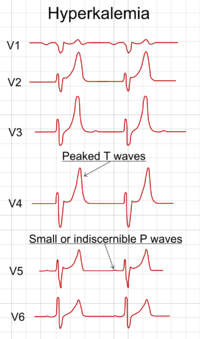Difference between revisions of "Critical values"
(+hypok in EKG) |
|||
| Line 4: | Line 4: | ||
In the context of surgical pathology, it is, perhaps more appropriately, called '''critical [[diagnosis]]'''. | In the context of surgical pathology, it is, perhaps more appropriately, called '''critical [[diagnosis]]'''. | ||
The general consensus is that these findings require a phone call and/or discussion with the clinician to ensure the situation is managed appropriately in a timely manner.<ref name=pmid16680772/> | The general consensus is that these findings (critical valves, critical diagnoses) require a phone call and/or discussion with the clinician to ensure the situation is managed appropriately in a timely manner.<ref name=pmid16680772/> | ||
==List of critical diagnoses== | ==List of critical diagnoses== | ||
Revision as of 18:44, 2 April 2015

Critical values is a concept which comes to anatomical pathology from clinical pathology.[1]
In the context of surgical pathology, it is, perhaps more appropriately, called critical diagnosis.
The general consensus is that these findings (critical valves, critical diagnoses) require a phone call and/or discussion with the clinician to ensure the situation is managed appropriately in a timely manner.[2]
List of critical diagnoses
Cytology
Critical diagnoses as per Pereira et al.:[2]
- Unexpected malignancy - vast majority of cases.
- Microorganisms in non-gynecologic specimens and FNA specimens.
Surgical pathology
The following is primarily constructed from a list in Pereira et al.[3]
General
- Large vessel in core biopsy specimen.
- Unexpected malignant diagnosis.
- Malignant diagnosis in the context of a medical emergency:
- Neoplasm causing paralysis.
- Malignancy causing superior vena cava syndrome.
Gynecologic
- No chorionic villi or trophoblasts on D&C in someone pregnant.
- Fat on endometrial biopsy.
- Fat on endocervical canal sampling.
Diagnostic of infection
- Fungal.
- Microbacterial.
- Bacterial.
- Viral.
Suggestive of infection
- Necrotic granulomas.
Cardiac
- Mesothelial cells in heart muscle biopsy.
- Transplant rejection.
Medical diseases
Renal
- Crescents in kidney biopsy.
List of diagnoses that should be reviewed
- AKA review diagnoses.
Review diagnoses are diagnoses that have significant treatment implications, and often mandate the opinion of a second pathologist and/or a sub-specialist. There is no general consensus around which diagnoses require review.
Examples of diagnoses that are high impact and are frequently reviewed:
- High grade columnar esophageal dysplasia.[4]
- Muscle invasive urothelial carcinoma of the bladder.[5]
See also
References
- ↑ Allen TC (May 2007). "Critical values in anatomic pathology?". Arch. Pathol. Lab. Med. 131 (5): 684–7. PMID 17491125. http://arpa.allenpress.com/arpaonline/?request=get-document&issn=0003-9985&volume=131&issue=5&page=684.
- ↑ 2.0 2.1 Pereira, TC.; Clayton, AC.; Tazelaar, HD.; Liu, Y.; Leon, M.; Silverman, JF. (Jun 2006). "Critical values in cytology.". Diagn Cytopathol 34 (6): 447-51. doi:10.1002/dc.20443. PMID 16680772.
- ↑ Pereira, TC.; Liu, Y.; Silverman, JF. (Aug 2004). "Critical values in surgical pathology.". Am J Clin Pathol 122 (2): 201-5. doi:10.1309/7NRW-7G68-4VEP-WPMR. PMID 15323136.
- ↑ Wright, TA. (Jun 1997). "High-grade dysplasia in Barrett's oesophagus.". Br J Surg 84 (6): 760-6. PMID 9189080.
- ↑ Coblentz, TR.; Mills, SE.; Theodorescu, D. (Apr 2001). "Impact of second opinion pathology in the definitive management of patients with bladder carcinoma.". Cancer 91 (7): 1284-90. PMID 11283928.